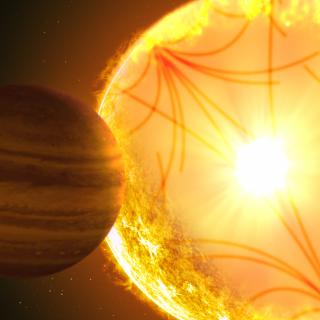Bibcode
Mathur, S.; Handberg, R.; Campante, T. L.; García, R. A.; Appourchaux, T.; Bedding, T. R.; Mosser, B.; Chaplin, W. J.; Ballot, J.; Benomar, O.; Bonanno, A.; Corsaro, E.; Gaulme, P.; Hekker, S.; Régulo, C.; Salabert, D.; Verner, G.; White, T. R.; Brandão, I. M.; Creevey, O. L.; Doğan, G.; Elsworth, Y.; Huber, D.; Hale, S. J.; Houdek, G.; Karoff, C.; Metcalfe, T. S.; Molenda-Żakowicz, J.; Monteiro, M. J. P. F. G.; Thompson, M. J.; Christensen-Dalsgaard, J.; Gilliland, R. L.; Kawaler, S. D.; Kjeldsen, H.; Quintana, E. V.; Sanderfer, D. T.; Seader, S. E.
Bibliographical reference
The Astrophysical Journal, Volume 733, Issue 2, article id. 95 (2011).
Advertised on:
6
2011
Journal
Citations
70
Refereed citations
52
Description
We analyze the photometric short-cadence data obtained with the Kepler
mission during the first 8 months of observations of two solar-type
stars of spectral types G and F: KIC 11395018 and KIC 11234888,
respectively, the latter having a lower signal-to-noise ratio (S/N)
compared with the former. We estimate global parameters of the acoustic
(p) modes such as the average large and small frequency separations, the
frequency of the maximum of the p-mode envelope, and the average line
width of the acoustic modes. We were able to identify and to measure 22
p-mode frequencies for the first star and 16 for the second one even
though the S/N of these stars are rather low. We also derive some
information about the stellar rotation periods from the analyses of the
low-frequency parts of the power spectral densities. A model-independent
estimation of the mean density, mass, and radius is obtained using the
scaling laws. We emphasize the importance of continued observations for
the stars with low S/N for an improved characterization of the
oscillation modes. Our results offer a preview of what will be possible
for many stars with the long data sets obtained during the remainder of
the mission.
Related projects

Helio and Astero-Seismology and Exoplanets Search
The principal objectives of this project are: 1) to study the structure and dynamics of the solar interior, 2) to extend this study to other stars (either single or in binary systems), 3) to search for extrasolar planets using photometric methods (primarily by transits of their host stars) and their characterization with complementary radial
Savita
Mathur